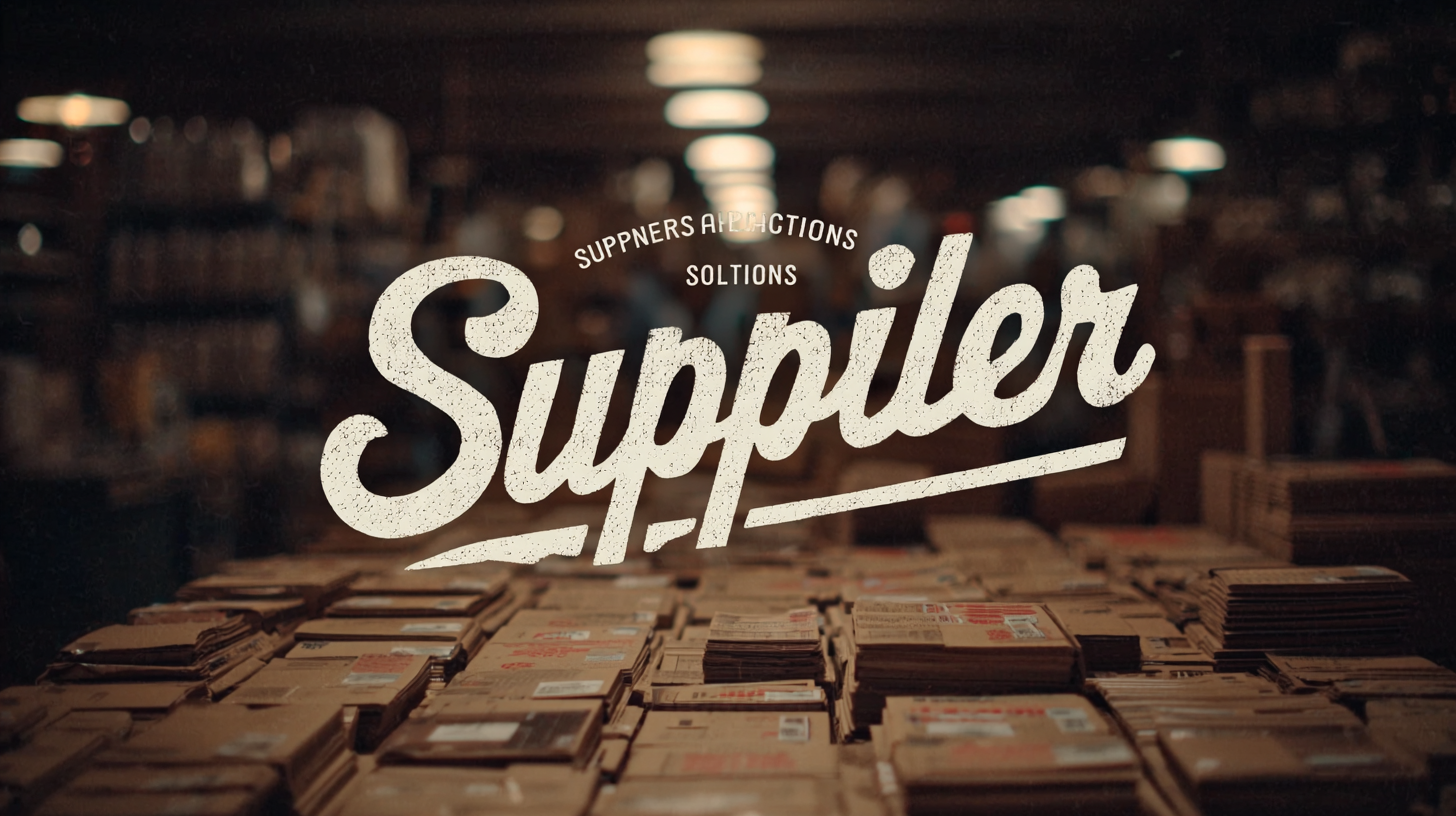
Exploring Industry Applications: Challenges Faced with the Best Supplier Solutions
In the ever-evolving landscape of global manufacturing, the significance of supplier partnerships has become increasingly paramount, particularly for companies seeking to leverage high-quality products from China. According to a report by McKinsey, nearly 80% of manufacturing executives believe that effective supplier collaboration can enhance operational efficiency and innovation. As industries strive to optimize their supply chains, they encounter various challenges, such as fluctuating material costs and the need for compliance with international quality standards. These issues underscore the critical role that suppliers play in maintaining competitive advantage. By exploring industry applications and the best supplier solutions, organizations can better navigate these challenges while ensuring that they remain aligned with the demands of the global market. The phrase "全球领先制造,中国优质出品" encapsulates the dual focus on global leadership and the pursuit of excellence in quality that is vital in today's supply chain strategies.

Understanding Key Industry Challenges in Selecting Suppliers
In today's competitive landscape, selecting the right suppliers is crucial for businesses across various industries. However, organizations often face significant challenges during this process. One of the key issues is the alignment of supplier capabilities with industry needs. Companies must evaluate whether potential suppliers can meet specific product requirements, quality standards, and timelines. This can become even more complex when considering global supply chains and varying local regulations.
**Tip 1:** Conduct a thorough needs assessment before beginning your supplier search. Understand what specific requirements are essential to your operations, such as technical specifications or compliance standards. This clarity will help in identifying suppliers that truly fit your needs.
Another challenge is managing supplier relationships. Establishing clear communication and building trust can be difficult, especially with new partnerships. Misunderstandings can arise regarding expectations, leading to delays or subpar performance.
**Tip 2:** Invest time in relationship management by scheduling regular check-ins and feedback sessions with your suppliers. Open communication channels can enhance collaboration and ensure that any issues are addressed promptly.
By taking a strategic approach to supplier selection and management, businesses can navigate these challenges more effectively and foster long-term partnerships that drive success.
Challenges in Selecting the Best Supplier Solutions
Emerging Technologies Shaping Supplier Solutions in 2025
As we look ahead to 2025, emerging technologies are poised to transform supplier solutions across various industries. Key innovations such as artificial intelligence, blockchain, and the Internet of Things (IoT) are carving out new pathways for efficiency and transparency. For instance, AI-driven analytics can help suppliers predict demand patterns, enabling them to optimize inventory management and reduce costs.
Tip: Embrace data analytics to keep track of supplier performance. Leveraging real-time data can help companies make informed decisions, streamline operations, and identify potential risks before they escalate.
Moreover, blockchain technology promises enhanced security and traceability within the supply chain. By providing an immutable record of transactions, blockchain can facilitate trust between suppliers and customers, ensuring accountability and reducing the risk of fraud.
Tip: Educate your team about blockchain’s benefits and consider partnerships with tech firms specializing in this area to integrate advanced solutions more effectively into your existing processes.
As these technologies evolve, organizations must be adaptable and proactive, positioning themselves to harness the full potential of these innovative supplier solutions.
Exploring Industry Applications: Challenges Faced with the Best Supplier Solutions - Emerging Technologies Shaping Supplier Solutions in 2025
| Industry | Emerging Technology | Challenges Faced | Potential Solutions |
|---|---|---|---|
| Manufacturing | IoT Integration | Data Security | Enhanced Encryption |
| Retail | AI-Powered Analytics | Data Privacy Issues | Compliance Training |
| Logistics | Blockchain | Integration Difficulty | Testbed Environments |
| Healthcare | Telemedicine | Regulatory Compliance | Streamlined Processes |
| Construction | Drones | Safety Concerns | Safety Training |
Evaluating Alternatives: Best Practices for Industry Leaders
In today's rapidly evolving industrial landscape, leaders must navigate a complex maze of supplier solutions to enhance operational efficiency and drive innovation. One critical aspect of this journey is evaluating alternatives to find the best-fit suppliers who can meet specific organizational needs. Industry leaders should adopt a systematic approach, starting with a comprehensive analysis of potential suppliers. This involves not only assessing their product offerings and pricing but also their ability to understand and align with the company's long-term strategic goals.
Another best practice is engaging in collaborative partnerships with suppliers. This goes beyond mere transactional relationships; it requires open communication and shared objectives. By fostering a culture of transparency and collaboration, companies can benefit from supplier insights that enhance product development and streamline processes. Additionally, leveraging technology, such as data analytics and digital platforms, can provide deeper insights into supplier performance, helping organizations make informed decisions that mitigate risks and seize opportunities in an ever-competitive marketplace.

The Role of Innovation in Overcoming Supplier-Related Obstacles
Innovation plays a crucial role in overcoming the obstacles that companies face when managing their supply chains. According to a recent report by Deloitte, 79% of supply chain leaders believe that innovation is essential in addressing the complexities of supplier relationships. The rise of advanced technologies such as artificial intelligence, blockchain, and the Internet of Things are transforming how organizations interact with their suppliers. These innovations enable real-time tracking of materials and streamline communication, thus reducing delays and ensuring transparency.
Furthermore, a study from McKinsey highlights that organizations that prioritize digital transformation within their supply chain management systems can improve their operational efficiency by up to 30%. This efficiency is critical, as 58% of companies report that supplier disruptions have negatively impacted their overall performance. By leveraging innovative supplier solutions, businesses can better navigate challenges such as unpredictability in supply, compliance issues, and quality control while enhancing their competitive edge in the market.
Future Trends in Supplier Collaboration and Technology Integration
In the rapidly changing landscape of industry, supplier collaboration and technology integration are becoming pivotal for businesses seeking to maintain a competitive edge. As companies leverage advanced technologies such as AI and blockchain, they can achieve greater transparency and efficiency in their supply chains. The integration of these technologies facilitates real-time data sharing between suppliers and manufacturers, allowing for informed decision-making and immediate responses to market demands. This synergy not only enhances operational efficiency but also fosters stronger relationships by aligning objectives and expectations.

Looking ahead, future trends indicate a shift towards more strategic partnerships between suppliers and companies. Organizations are recognizing that collaboration goes beyond transactional relationships; it's about building long-term alliances that drive innovation. As companies invest in integrated platforms that harness analytics and digital tools, they can better anticipate disruptions and adapt to changes in consumer behavior. Moreover, these partnerships are expected to focus on sustainability, as stakeholders increasingly prioritize responsible sourcing and environmentally friendly practices. This evolution in supplier collaboration signifies a move towards a more resilient and adaptive industry, where technology plays a crucial role in facilitating mutual growth and success.
